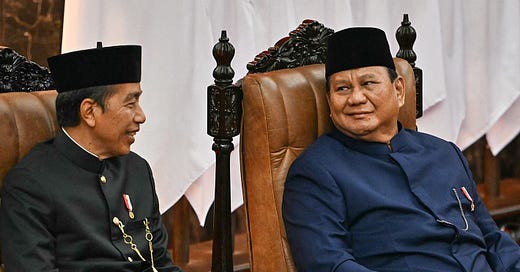Jakarta Court Decision Complicates Prabowo's Political Map
Constitutional Court opens up process to allow more parties to vie for presidency
Indonesia's Constitutional Court delivered a surprise ruling on January 3 that has left political observers wondering what is behind what seems to be a welcome change in the country's electoral rules, quashing the threshold for presidential and vice-presidential candidacies. The voided law stipulates that a party or coalition must secure at least 20 percent of parliamentary seats or 25 percent of the popular vote nationwide in the previous election to nominate a candidate. The restriction made it difficult for smaller parties to field candidates and was blamed for stifling democratic engagement.
Regardless of why the court made its ruling, however, one big beneficiary is likely to be former President Joko Widodo, who is said to want his eldest son, current Vice President Gibran Rakabuming Raka, to become president when Prabowo Subianto’s term ends in 2029. By opening up the political process, it also possibly renders Prabowo’s current grand coalition of political parties fragile in picking its own 2029 candidate.
Jokowi, as the former president is known, already engineered Gibran’s ticket to become Prabowo’s running mate in the election – generating considerable anger in Jakarta’s political circles – when a panel of Constitutional Court judges headed by Anwar Usman, Jokowi's brother-in-law, in October 2023 reduced the age of candidates from 40 to 35 only for those with experience as elected officials, which was tailored for Gibran, then the 36-year-old Solo mayor since 2021. Public outrage over the decision cost Anwar Usman his job as chief justice, although he remains on the court.
Chief Justice Suhartoyo read the verdict. Two justices, Anwar Usman and Daniel Yusmic P. Foekh, dissented. According to the government-backed national news agency Antara, Justice Saldi Isra stated that while imposing a presidential threshold doesn’t effectively limit the number of political parties participating, the threshold was set without strong rationality or justifiable calculation and that it would be difficult for political parties to meet the threshold percentage without causing a “prejudice of conflict of interest."
Out of power and in quiet competition with Prabowo, who has sought to swing all of the major political parties behind him in an unassailable coalition, Jokowi has no real political party after being unceremoniously dumped for disloyalty by an irritated Megawati Sukarnoputri from her Indonesian Democratic Party of Struggle (PDIP). Gibran was earlier expelled from the PDIP after becoming Prabowo’s running mate and spurning PDIP candidate Ganjar Pranowo. Gibran told the Jakarta Globe in December that he has yet to pick a party. Another Widodo son, Kaesang Mangarep, 30, is chairman of the tiny Indonesian Solidarity Party (PSI).
Even before leaving power, Jokowi has been undergoing a series of body blows to his popularity, in part because of what is perceived as his overweening ambition and the open irritation with him among the political elite. Publicly, many Indonesians now refer to Jokowi as Mulyono, the name he was given at birth but which his parents later changed because it was said to be unlucky.
Last week, the Amsterdam-based Organized Crime and Corruption Reporting Project named him a finalist in its annual list of individuals who have “done the most to advance crime and corruption globally, thus damaging democracy and human rights.” Other notable figures on the list included former Bangladesh Prime Minister Sheikh Hasina, Kenyan President William Ruto, and Indian businessman Gautam Adani. An angered Jokowi blasted the report as politically motivated, saying: “People can use any vehicle to create such a horrible framing, whether through NGOs, political parties or mass organizations.”
“Jokowi might still think his personal popularity will allow him to get his kid elected president in 2029 and this ruling could make it possible for him to run,” said a western businessman with long familiarity with Indonesian politics. “I believe that the elites of most every party and the business elites are sick of Jokowi. When he oiled his kid into the vice presidency, a lot of pretty powerful people were really angry. Jokowi treated a lot of people very badly.”
Every party of any consequence except PDIP is in Prabowo's coalition, with the aim of creating in effect a one-party political state. Jokowi has been squeezed out of heading that coalition over irritation with his campaign to remain a political kingmaker, first seeking to change the constitution to seek a third presidential term, then entertaining the idea of delaying the 2024 general election before not only installing his son as a vice-presidential candidate but playing a critical role in engineering Prabowo’s resounding victory.
Prabowo, however, is clearly his own man, putting other governmental priorities ahead of Jokowi’s new Kalimantan capitol, which is far behind schedule, and setting political antennae aquiver with a proposal in December to scrap one of the country’s two nationwide elections, of mayors, governors and regents, in a bid to cut costs, he said, but which was viewed as a return to the appointive process used during Indonesia’s three-decade era of authoritarian rule by Prabowo’s one-time father-in-law, Suharto, who was ousted from power in 1998 by nationwide protests after 31 brutal and corrupt years. Regional legislatures, Prabowo told a Golkar Party meeting, would choose local officials instead, which he said would free up funds to spend on things like his signature free meals for schools program.
It is uncertain if there is a budding competition between Prabowo and Jokowi, who rescued him from two failed presidential runs and obscurity by making him defense minister in his 2019-2024 administration. But Jokowi has been denied a commanding position in Golkar, Indonesia’s oldest and second-biggest political party, one of the components of Prabowo’s grand coalition, after he engineered the ouster of the party chairman, Airlangga Hartarto, last August.
“I think his aim had been to be the godfather of the coalition, which includes almost everybody of any note. The Golkar thing was a big blow.” a source said. “But it appears he overreached.”




